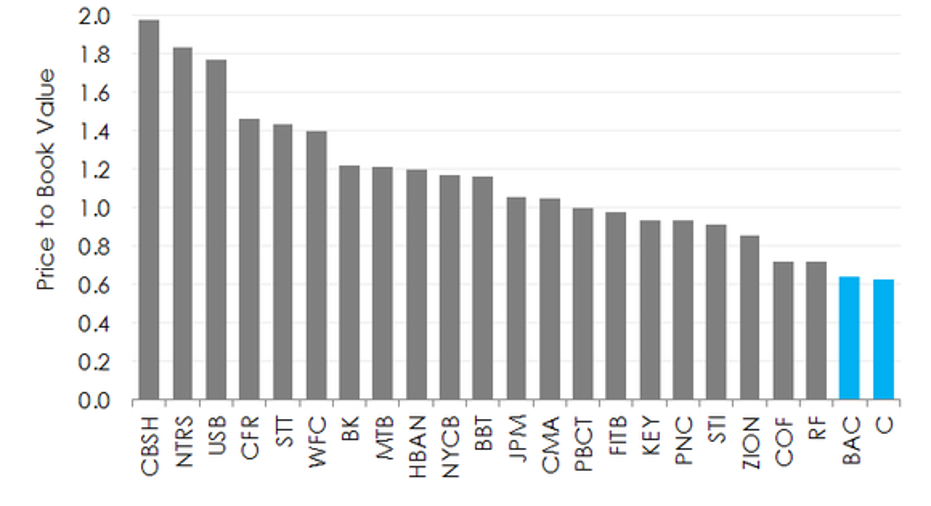Bank of America and Citigroup Are the Cheapest Big Bank Stocks Right Now

Image source: iStock/Thinkstock.
If you look at a chart of the S&P 500, it'd be easy to think that there aren't any bargains right now for investors. Low interest rates combined with economic uncertainty in Europe and China has caused money to flow into U.S. equities over the last few years, pushing the large-cap index up to 40% above its pre-crisis high.
But there's one group of stocks that hasn't fully participated in the rally: bank stocks. For a variety of reasons, shares of many of the nation's biggest banks continue to trade for substantial discounts to their book values.
Bank of America (NYSE: BAC) and Citigroup (NYSE: C) are the poster children of low bank stock valuations. Their shares trade for 37% below their respective book values, according to data from YCharts.com. That makes them the two cheapest bank stocks on the KBW Bank Index, which tracks shares of 24 large U.S.-based lenders.
Data source: YCharts.com. Chart by author.
Low interest rates play a role here, too, as they weigh on banks' ability to generate interest income. Costly new regulations similarly impact banks, pushing expenses higher at the same time that recently enacted rules reduce revenue. And new capital and liquidity benchmarks constrain how much banks can earn from their portfolios of loans and interest-earnings securities.
The net result is that many banks have struggled to earn their cost of capital since the crisis, which implies that they're destroying shareholder value as opposed to creating it. Last year, for example, Bank of America's return on common equity was 6.3%, which is roughly half its 12.2% cost of equity capital, according to an estimate by Rafferty Capital Markets' Dick Bove.
Citigroup fared better in 2015, producing a 9.1% return on average common equity. Like Bank of America, however, this was also below Citigroup's cost of equity capital, which Bove estimates to be 12.9%. This may go without saying, but it's for this reason that shares of these two banks trade for such sizable discounts to their book values.
You can get a sense for how cheap Bank of America's and Citigroup's stocks seem to be by comparing them to their peers on the KBW Bank Index. The average stock on the index trades for a 14% premium to book value. And many are even more expensive. U.S. Bancorp is priced at a nearly 80% premium to its book value, while Wells Fargo trades at a 40% premium.
Whether this makes Bank of America and Citigroup stocks a buy right now boils down to an investor's confidence in these banks' abilities to one day soon report profitability figures above their capital costs. If interest rates inch higher, boosting bank profitability, then today's prices will seem like a bargain in hindsight. But if rates stay where they are for another five or 10 years, as has been the case in Japan since the mid-1990s, then bank stock valuations shouldn't be expected to go anywhere, either.
A secret billion-dollar stock opportunity The world's biggest tech company forgot to show you something, but a few Wall Street analysts and the Fool didn't miss a beat: There's a small company that's powering their brand-new gadgets and the coming revolution in technology. And we think its stock price has nearly unlimited room to run for early in-the-know investors! To be one of them, just click here.
John Maxfield owns shares of Bank of America, U.S. Bancorp, and Wells Fargo. The Motley Fool owns shares of and recommends Wells Fargo. The Motley Fool recommends Bank of America. Try any of our Foolish newsletter services free for 30 days. We Fools may not all hold the same opinions, but we all believe that considering a diverse range of insights makes us better investors. The Motley Fool has a disclosure policy.



















